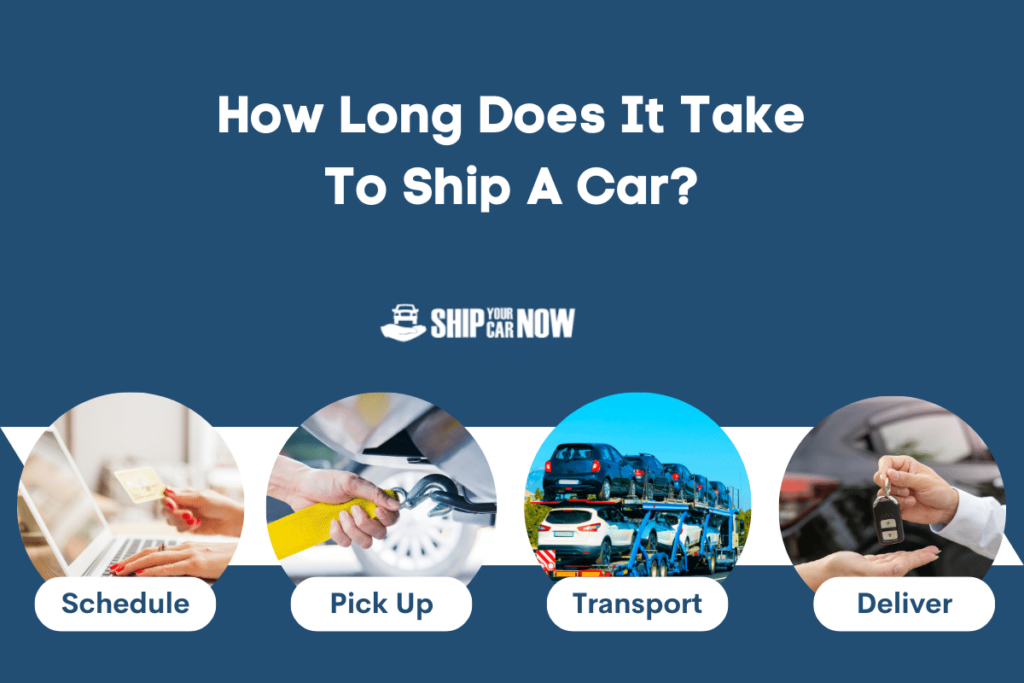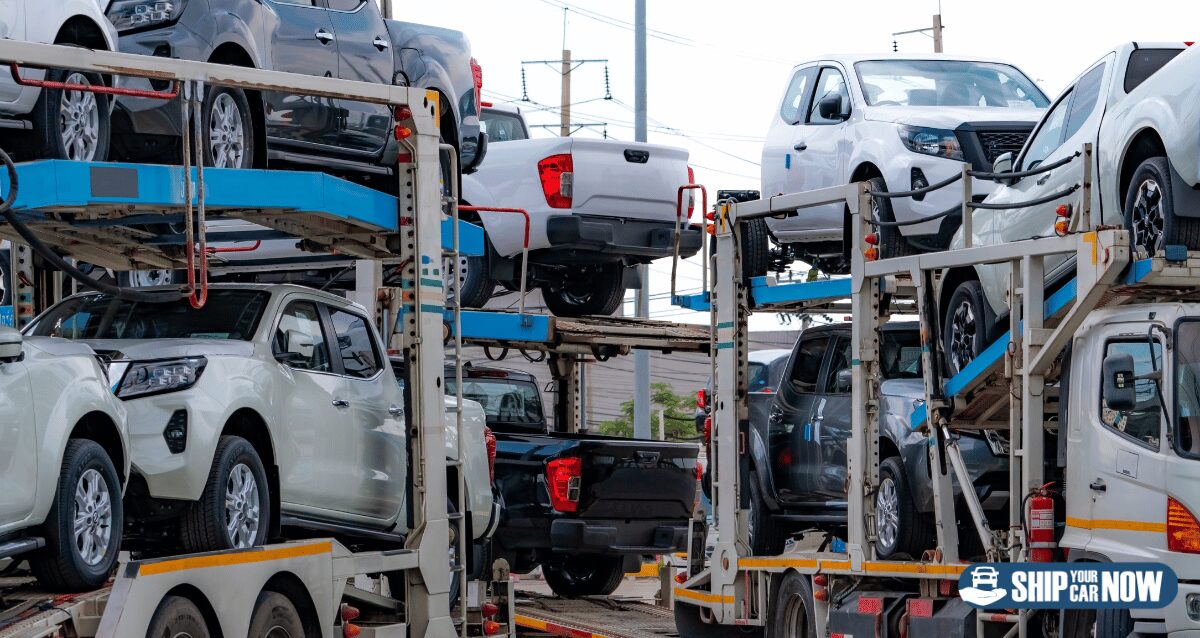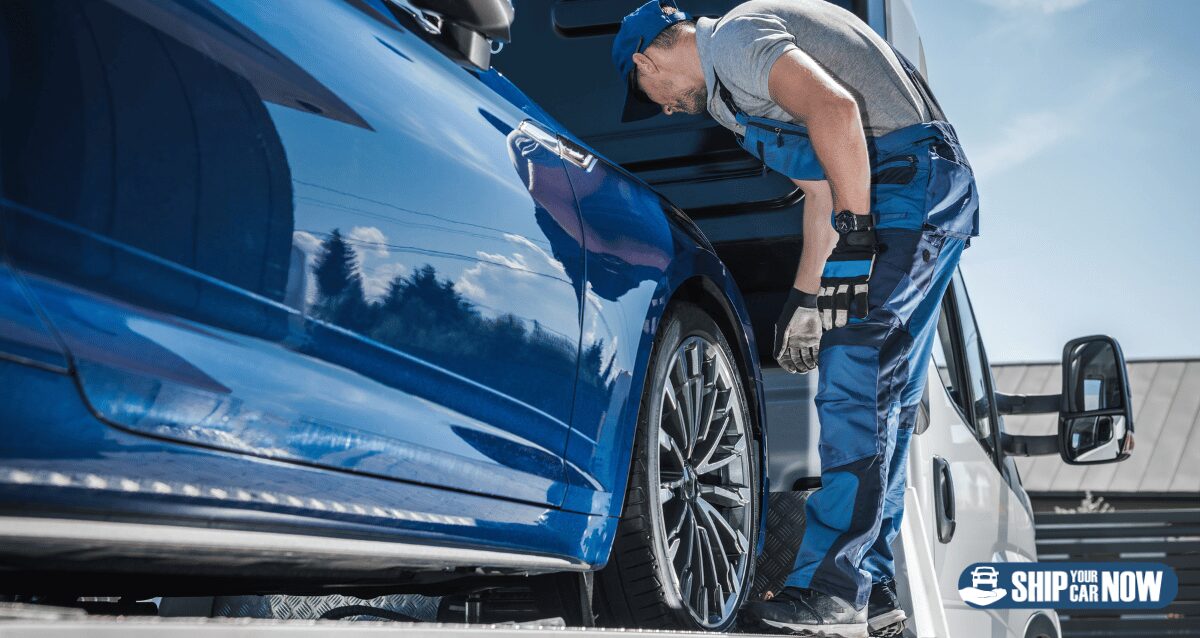Time is money. Simple as that. And when it comes to car shipping, one of the most common questions we is “How long does it take for my car to ship?” It’s an important question, but it depends on a few things. The truth is, deciphering your car shipping timeframe is simple but varied: will it be a few days or several weeks? It’s time to demystify the timing by detailing how distance, carrier availability, and transport preferences shape the journey’s length.
No excessive adjectives, no fluff, just the facts you’ll need to plan your car shipping schedule effectively.
Key Takeaways
- Your car’s shipping time can vary based on distance, carrier availability, route complexity, and the shipping method you choose – open car transport is more common and economical, while enclosed car transport offers more protection.
- Seasonal demand and weather conditions can significantly affect car shipping costs and time frame. Peak seasons lead to shorter transit times but higher rates, and adverse weather can potentially cause delays.
- Planning ahead can ease the car shipment process with tips like booking early to secure better rates and dates, providing accurate info about your car, and keeping the lines of communication open with the shipping company.
Estimating Your Car’s Journey Duration
So, you’ve decided to opt for car shipping services to transport your precious vehicle. Now, you may be wondering, “How long will my car’s journey take?” The answer to that question isn’t as straightforward as you might think.
Multiple factors can influence the duration of your car’s trip, such as the distance it needs to travel, the availability of carriers, and the complexity of the route. Grasping these factors will enable you to strategize your car shipping journey effectively.
Note that knowing how to prepare your vehicle properly is also essential to an easy and stress-free car shipping journey.
Furthermore, before shipping, ensure that your car meets the necessary car transport requirements – your ability to do so will heavily weigh on the shipping timeframe for your vehicle.
Covering long distances is a significant part of the auto transport process. The factors that can affect the timeframe include:
- The larger the distance between the pickup and delivery locations, the longer your vehicle will be on the road.
- The availability of carriers also plays a vital role in determining the timeframe.
- The size and weight of your vehicle, as well as any additional requirements you might have, can affect carrier options and scheduling.
- The complexity of the route and traffic conditions can add to the transit time.
Let’s examine these factors in more detail.
Distance and Transit Times

A short trip within a state or nearby rural areas can usually be completed within a few days. In contrast, shipping a car across the country can take up to one or two weeks.
It’s also important to consider transit times. Delivery periods can range from 1 to 2 days for distances of 0 to 200 miles to 7 to 9 days for distances exceeding 2,400 miles.
Therefore, when strategizing your car shipping journey, take into account the distance and recalibrate your anticipations about delivery times accordingly.
Carrier Availability and Scheduling

- If you’re shipping your car between major cities, you’re in luck, as these routes tend to have more frequent service.
- However, if your pick-up or delivery location is remote, finding a carrier might take a bit longer.
- The size and weight of your vehicle can also limit your carrier options, as larger and heavier vehicles require more fuel and may necessitate specialized carriers.
Moreover, if you have additional requirements, like extra insurance or special handling, this can also affect carrier availability and scheduling.
To circumvent potential delays, it’s advisable to reserve your car transport service approximately two weeks before your preferred pick-up date.
Route Complexity and Traffic
The factors that can influence the shipping duration of your vehicle include:
- The complexity of the route your vehicle will travel
- The traffic conditions it will face
- Difficult road conditions or geographical challenges along the route
- Shipping into and out of heavily populated urban areas with high traffic volume
These factors can potentially lengthen the shipping time.
Moreover, unexpected disruptions like road incidents or construction work can cause unexpected delays.
Therefore, when organizing your car transport, don’t forget to take into account the route and possible traffic situations.
The Influence of Shipping Methods on Delivery Times
Having discussed the fundamentals, let’s proceed to another key aspect of car shipping – the shipping method.
The method you choose to ship your car can significantly influence the delivery time. Shipping methods include open or enclosed transport, door-to-door or terminal-to-terminal shipping, and even air freight for international shipments.
Each method has its pros and cons, and understanding these can help you make a more informed decision.
The most popular options for transporting vehicles are:
- Open transport: This involves using an open-air carrier and is known for its cost-effectiveness. However, it exposes your car to weather and road conditions.
- Enclosed transport: This offers more protection but comes at a higher cost.
- Expedited shipping service: This option allows for quicker delivery of your vehicle.
- Specialized equipment for non-running vehicles: Some auto transport services offer specialized equipment to transport vehicles that are not in running condition.
Let’s examine these shipping methods more thoroughly.
Open vs. Enclosed Transport

However, your vehicle will be exposed to the elements and road debris throughout the journey.
Enclosed auto transport offers enhanced protection for your vehicle. Here are some key features:
- Your car is securely placed in a fully enclosed carrier
- Protection from the elements and road debris
- Ensures safety during transit
- Ideal for classic, antique, or high-value models
Though it comes at a higher cost and may take a little longer due to lower carrier availability, enclosed transport might be the right choice for your vehicle.
Door-to-Door Service Versus Terminal Shipping
Another factor to consider when choosing a shipping method is how your vehicle will be picked up and delivered. It’s simple. Our door-to-door service is based on convenience. Have your car picked up from your location and delivered directly to your desired destination. Done.
However, it often carries a premium price over terminal-to-terminal service.
With terminal-to-terminal shipping, you’ll drop off your vehicle at a designated location and pick it up from a terminal near your destination.
This method can be more cost-effective and offer more predictable routing, but it might be less convenient and involve additional handling risks. As with all decisions regarding car shipping, the best choice depends on your specific needs and circumstances.
Expedited Shipping Solutions

These services guarantee faster vehicle pickup or delivery, offering greater scheduling flexibility. They’re particularly beneficial for urgent transport needs or last-minute moves.
Nonetheless, remember that expedited shipping incurs a higher charge compared to most companies’ regular options. The premium can vary widely, often costing 20% to 40% more than conventional shipping rates. But if time is of the essence, the extra cost might be a worthwhile investment.
Seasonal Factors and Their Impact on Car Shipping
Just as seasons affect various aspects of our lives, they also have a significant impact on car shipping. From high-demand seasons to weather conditions, seasonal factors can influence your car’s shipping timeframe and costs.
Understanding these seasonal variations can help you plan ahead for your car shipping journey more effectively and potentially save you time and money.
Peak seasons for car shipping, such as summer and holidays, result in shorter transit times due to increased demand. However, the spike in demand can also lead to higher rates and longer waiting times. On the other hand, adverse weather conditions can cause delays in car shipping services.
Let’s investigate these seasonal factors with a finer lens.
High-Demand Seasons
Summer, particularly June, July, and August, is considered the peak season for car shipping [1]. This is the time when many people need auto transport services, including:
- Families relocating
- Companies moving their staff
- Students returning home from college
- Car sales increasing
- Snowbirds migrating to warmer regions
During this peak season, demand rises, leading to shorter transit times but also higher prices and potential delays.
On the other hand, off-peak seasons like February and March offer a more predictable period for auto shipping with fewer delays and often lower prices.
Therefore, if you have flexibility with your shipping dates, you might want to avoid high-demand seasons.
Weather and Seasonal Road Conditions

For example, during heavy snowfall, drivers are required to operate at reduced speeds or even stop completely, prolonging the delivery time [2].
Season-specific events like hurricane season can also disrupt car shipping schedules. Therefore, it’s essential to consider the weather conditions during your planned shipping timeframe and allow for potential delays.
Planning Ahead: Tips for a Timely Car Shipment

Here are some tips for planning ahead: make early reservations, provide accurate information, and maintain effective communication with the transport company. Following these tips can help you avoid unnecessary delays and ensure that your car arrives safely at its destination.
Making early reservations can provide you with:
- A wider choice of shipping dates
- Better compatibility with your schedule
- A chance to secure favorable rates
- Avoidance of the rush of high-demand seasons.
Providing accurate information about your vehicle and its condition can prevent potential complications during the shipping process and ensure that your vehicle is properly handled.
Finally, maintaining open communication with the transport company can keep you informed about your car’s shipping status and allow you to address any issues promptly.
Early Reservation Advantages
Booking your car transport early comes with several advantages:
- It allows you to avoid congested periods when many people are relocating, such as in April and May.
- It provides you with a wider choice of shipping dates, leading to better compatibility with your personal schedule.
- Booking early can lead to reduced rates and decreased wait times as carriers have increased availability, especially in major cities.
So, if you want to secure access to the best deal and ensure a smooth shipping process, it’s a good idea to make your reservations well in advance.
Accurate Information and Preparation
Providing accurate information and preparing your car for shipping are crucial steps in the planning process. Before shipping, be sure to:
- Clean your car thoroughly
- Remove all personal items
- Document its condition with photos
- Check basic functions, tires, battery, and for fluid leaks
These steps can help prevent potential issues during transportation.
If your vehicle has any special requirements or conditions, communicate them clearly to the shipping company to ensure proper handling. Remember, a well-prepared car not only minimizes the risk of damage but also contributes to a smoother and more efficient shipping process.
Communication with the Transport Company
Communication is key in any transaction, and car shipping is no exception. Ensuring that you have open lines of communication with your transport company can make a significant difference in your experience. Here are some tips for effective communication during the car shipping process:
- Provide accurate contact information to the transport company to ensure smooth communication and timely updates on your car’s shipping status.
- Respond to communications from the transport company in a timely manner.
- Provide any necessary updates on your end, such as changes in pick-up or delivery locations or dates.
By following these tips, you can ensure that communication is smooth and efficient throughout the car shipping process.
Being proactive in the communication loop allows you to stay informed and address any potential issues promptly, contributing to a smoother shipping process.
Navigating Potential Delays and Ensuring Smooth Shipping Process
Despite our best planning efforts, things don’t always go as expected. Unpredictable factors like unexpected road closures and driver regulations can cause delays in the car shipping process.
However, with the right knowledge and preparation, you can navigate these potential delays and ensure a smooth shipping process.
Transit times may be delayed due to road closures caused by construction, traffic jams, and accidents. These factors can all contribute to delays in reaching your destination. Moreover, drivers are required to follow certain regulations, such as mandated rest hours, which can also affect the shipping duration.
Handling these potential delays requires flexibility, patience, and open communication with the shipping company.
Let’s probe further into these elements.
Unexpected Road Closures and Diversions
Road closures and diversions can throw a wrench in your car shipping plans. Some factors that can affect your shipping schedule include:
- Construction
- Traffic jams
- Accidents
- Severe weather
These can lead to detours, delays, or changes in route, which may result in slower transport times.
Shipping companies often pre-plan for possible diversions to minimize the impact on delivery times.
However, it’s always a good idea to allow for some flexibility in your shipping schedule to accommodate any unexpected changes in the route.
Handling Extra Stops and Driver Regulations
Apart from road conditions, other factors like extra stops and driver regulations can impact the overall shipping duration.
Car transport carriers often make extra stops to load and unload vehicles, which is a necessary part of the process but can add unnecessary stress to the shipping duration.
Additionally, drivers are subject to regulations that limit their driving hours per day and require mandatory rest periods.
These rules are in place for safety reasons and must be adhered to, even if they prolong the shipping time. Therefore, when planning your car shipping journey, make sure to factor in these potential delays.
Insurance Coverage and Protection During Transit

Having adequate insurance coverage during transit can provide you with peace of mind and protection against potential damages. It’s crucial to understand the different types of insurance policies available and the procedures for making a damage claim.
All auto transport companies are required by law to carry liability insurance, offering a basic level of protection during transit [3].
However, the type and amount of coverage can vary, so it’s important to thoroughly understand the insurance policy of your chosen auto transport company. Let’s investigate this more thoroughly.
Understanding Insurance Policies
When it comes to insurance, knowledge is power. Generally, car shipping carriers have cargo insurance, which covers any damages to vehicles from the moment they are picked up to when they reach their destination.
However, it’s also worth checking whether your regular auto insurance policy extends coverage to your vehicle while it’s being transported.
For vehicles with a higher value than the carrier’s insurance coverage, supplemental third-party insurance, such as GAP insurance, may be available. Before shipping your car, make sure to obtain a Certificate of Insurance from the shipping company and document all insurance details in writing.
Damage Claim Procedures

Start by contacting the brokerage that arranged transport and the carrier responsible for delivery. Review your bill of lading carefully, as it describes your vehicle’s condition before and after transport and will serve as the basis for your claim.
Document all damage meticulously, as timing and proof of occurrence are critical for claim approval.
Follow all guidelines provided by the transport company for submitting photos, the bill of lading, and any other required documentation for the claim. Remember, even if there’s a dispute about the condition of existing damage to the vehicle, the evidence you’ve collected will allow you to proceed with a claim.
Cost Considerations for Car Shipping Timeframes
Cost is often a major consideration when planning a car shipping journey. Understanding the pricing structure of auto shipping companies and how it affects the shipping timeframe can help you budget effectively and ensure a smooth process.
While it’s natural to seek the most cost-effective option, it’s important to balance cost and speed to ensure that your vehicle is shipped safely and arrives on time.
Car shipping costs can vary based on factors such as the transport type, distance, and vehicle size. For example, enclosed trailer shipping is generally more expensive than open trailer options, and longer distances result in higher rates.
Additionally, expedited shipping, which guarantees faster pickup or delivery, comes at a higher cost. Let’s probe further into these cost aspects.
Pricing Structure of Auto Shipping Companies
Auto shipping companies establish their individual pricing structures, which can affect the cost of your car’s journey. For example, shipping costs are often calculated on a per-mile basis, with longer distances resulting in higher rates. However, the type of carrier you choose can also impact the cost.
Enclosed trailer shipping, which provides enhanced protection for your vehicle, is generally about 50% more expensive than open trailer shipping options.
Additional costs may also be incurred by experienced carriers for shipping inoperable vehicles or larger vehicles that require more space on the carrier. By understanding these pricing structures, you can make a more informed decision about the best shipping method for your needs and budget.
Balancing Cost and Speed
Balancing cost and speed can be a tricky aspect of car shipping. On one hand, you want your vehicle to arrive as quickly as possible.
On the other hand, you don’t want to break the bank to achieve that. This is where flexibility comes into play. If you have some leeway in your delivery timeframe, you can often secure better deals.
Similarly, effective negotiation with auto shipping companies can help you get best value and strike a fair balance between cost and speed. Lastly, using real-time car shipping cost calculators can help you compare current rates from various carriers and find a balance that works for you.
ShipYourCarNow: Your Dependable and Affordable Car Transport Solution
In search of a dependable and cost-effective car transport service? Look no further than ShipYourCarNow.
As an industry leader in vehicle transport, we offer a full range of car transport services that cater to both businesses and individuals. Whether you need to ship a car domestically within the US or require international car shipping services, we’ve got you covered. And the best part? All our car shipping comes with Claim Assistance, providing you with added peace of mind.
We understand that every car shipping journey is unique, which is why we offer customizable solutions to suit your needs.
As one of the leading car shipping companies, our car shipping company provides options such as door-to-door shipping for convenience or terminal-to-terminal shipping for cost-effectiveness. Our expert logistics agents are standing by 24/7 to help with your cross-country car shipping and provide you with accurate car shipping quotes. So why wait? Contact us today for reliable, affordable car transport services.
Full Summary
Navigating the intricacies of car shipping doesn’t have to be a daunting task. By understanding the factors that influence the shipping timeframe, choosing the right shipping method, planning ahead, and addressing potential delays, you can ensure a smooth and timely car shipment. Moreover, knowing about insurance coverage and damage claim procedures can provide you with peace of mind during transit.
It’s also crucial to consider the cost implications and strive to balance cost and speed. Remember, effective communication with your own car transport company, is key to a successful car shipping journey. So, the next time you need to ship your car, you can do so with confidence and knowledge.
Frequently Asked Questions
How long does a car take once shipped?
It usually takes between a few days and two weeks for your vehicle to get from the point of origin to its final destination, but you can reduce the time frame by booking early, using open transport, and taking advantage of terminal-to-terminal shipping.
Why do car deliveries take so long?
Car deliveries can take longer due to transportation companies lacking proper equipment for larger vehicles, unexpected weather conditions, vehicle breakdowns, and paperwork issues at auto dealerships. This can lead to delays in getting your new car.
How long do trucks take to deliver cars?
Truck deliveries for cars can take anywhere from a few days for local transport to a week or more for cross-country trips.
How long do car doors take to ship?
For domestic shipments, car doors may arrive in a few days to a week, while international shipments can take longer.
How much does shipping cost for a car?
Shipping costs for a car vary depending on the carrier type and distance.
Senior automotive logistics professional with a passion for the industry and a 10+ year history of accomplishments. Proven track record of exemplary client management working with both RMCs, Van Lines and OEMs. Keen ability to react to an ever-changing marketplace while offering superior technology solutions, programs and services. Architect of award winning auto transport portal technology offering transparency and agility to clients, agents and transferees. Successful team builder and leader easily managing budgets with effective leadership, strategic planning, and problem-solving capabilities.
















